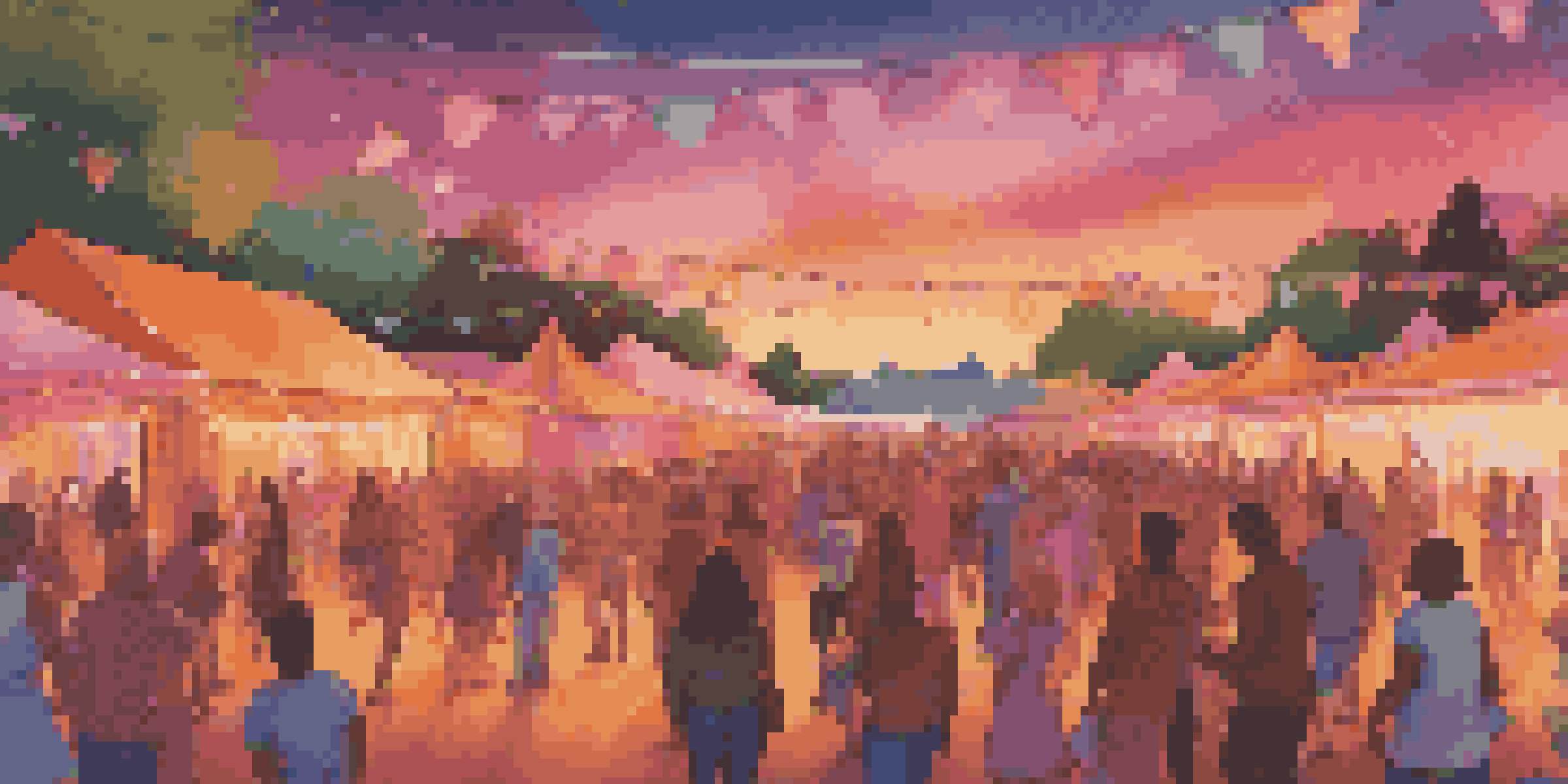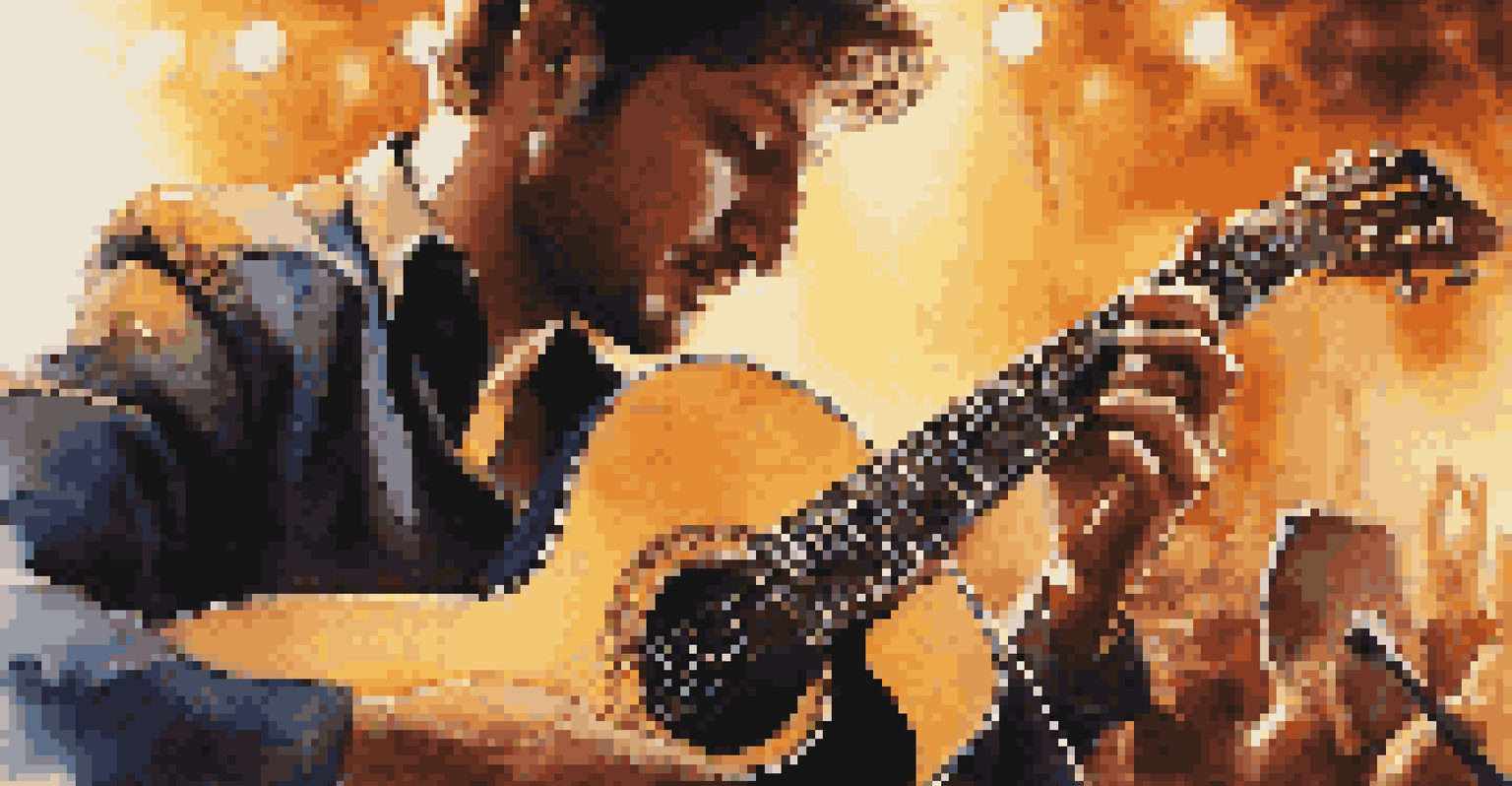The Legacy of Music Festivals: Past, Present, and Future

The Origins of Music Festivals: A Historical Overview
Music festivals have roots that trace back to ancient civilizations, where music was integral to cultural and spiritual celebrations. Events like the ancient Greek Dionysia featured dramatic performances and music, laying the groundwork for communal music experiences. Over time, these festivals evolved, incorporating various musical styles and purposes, from religious gatherings to folk celebrations.
Music is the shorthand of emotion.
As societies changed, so did the formats of festivals. The Renaissance period saw music becoming more accessible, with public performances drawing larger crowds. Fast forward to the 20th century, and we witness the birth of modern music festivals, exemplified by events like Woodstock in 1969, which became iconic for its blend of music, peace, and counterculture.
These early festivals set the stage for the vibrant, diverse music scene we enjoy today. They not only showcased talent but also fostered a sense of community, a theme that remains central to music festivals around the world.
The Cultural Impact of Music Festivals in Society
Music festivals have always been more than just concerts; they serve as cultural touchstones that reflect societal values and changes. They provide a platform for artists to express themselves and for attendees to connect over shared interests. This sense of belonging can be particularly powerful, especially for younger generations navigating their identities.

For instance, festivals like Coachella and Glastonbury have become synonymous with trends in fashion, art, and social movements. They not only celebrate music but also promote causes such as environmentalism and social justice, encouraging attendees to engage with important issues while enjoying their favorite acts.
Music Festivals' Rich History
Music festivals have evolved from ancient cultural celebrations to modern events that foster community and showcase diverse musical styles.
In this way, music festivals act as catalysts for cultural exchange, bringing together diverse groups and fostering dialogue. The impact of these gatherings extends beyond the music, shaping communities and influencing broader societal trends.
How Music Festivals Foster Community and Connection
At their core, music festivals create spaces where people come together to celebrate a shared love for music. This connection often transcends geographical and cultural boundaries, making festivals a melting pot of experiences and backgrounds. The collective energy at these events can be electrifying, as strangers bond over a favorite song or artist.
Music can change the world because it can change people.
Many attendees describe the feeling of camaraderie that permeates festivals, often finding lifelong friendships in the process. Whether it's singing along to a beloved artist or sharing a moment of silence during a poignant performance, these experiences unite people in profound ways.
Moreover, festivals often encourage attendees to engage in activities outside of music, such as art installations, workshops, and food experiences. This multi-faceted approach not only enriches the festival experience but also strengthens community ties, making attendees feel like they are part of something larger.
The Evolution of Music Festivals in the Digital Age
The rise of technology has transformed the landscape of music festivals, from ticket sales to live streaming. Social media platforms allow festivals to reach wider audiences, enabling fans to engage with their favorite artists and fellow festival-goers long before the event. This digital connection builds excitement and anticipation, often translating into higher attendance.
Additionally, live streaming has made it possible for those who can’t attend in person to experience the magic of festivals from the comfort of their homes. Major festivals like Lollapalooza and Tomorrowland have embraced this technology, broadcasting performances to millions around the globe, thus democratizing access to music.
Cultural Significance of Festivals
Festivals serve as cultural touchstones, promoting social movements and allowing for artistic expression while connecting attendees over shared experiences.
However, this shift also raises questions about the essence of live experiences. While digital access enhances reach, it’s essential to consider how technology shapes our interactions and the authenticity of the festival experience itself.
The Role of Sustainability in Modern Music Festivals
As awareness of environmental issues grows, music festivals are increasingly prioritizing sustainability. Many organizers are implementing eco-friendly practices, such as waste reduction, renewable energy sources, and sustainable transportation options. This shift reflects a broader cultural movement towards environmental responsibility, resonating with festival-goers who care about the planet.
For example, festivals like Glastonbury have made significant strides in reducing waste and promoting recycling, setting a standard for others to follow. Attendees are often encouraged to participate in these initiatives, fostering a sense of responsibility and community care.
As we look to the future, sustainability will likely be a defining characteristic of music festivals. With younger generations leading the charge for environmental change, festivals that prioritize eco-consciousness will not only thrive but also inspire positive action beyond the stage.
Challenges Facing the Future of Music Festivals
Despite the vibrancy and cultural significance of music festivals, they face a range of challenges moving forward. Issues such as rising costs, safety concerns, and the impact of global events like the COVID-19 pandemic have tested the resilience of these gatherings. Many festivals had to adapt quickly, pivoting to virtual formats or scaling back attendance to ensure safety.
Moreover, the competition among festivals is fierce, with new events popping up every year. This saturation can dilute the unique experiences that festivals aim to offer, making it harder for individual events to stand out and attract audiences.
Future Trends in Music Festivals
The future of music festivals will focus on diversity, technology integration, and community engagement, shaping them as spaces for celebration and social impact.
Navigating these challenges will require creativity and innovation from organizers. By embracing change and focusing on what makes their festivals special, they can continue to evolve and thrive in an ever-changing landscape.
The Future of Music Festivals: Trends to Watch
Looking ahead, several trends are poised to shape the future of music festivals. One notable trend is the increased focus on diversity and inclusion, as organizers strive to create lineups that represent a broader range of voices and genres. This shift not only enriches the musical experience but also fosters a more welcoming environment for attendees.
Another trend is the integration of technology, with innovations like augmented reality and interactive experiences becoming more common. These advancements promise to enhance the festival experience, making it more immersive and engaging for attendees.

Finally, as music festivals continue to adapt and evolve, the emphasis on community and social impact will likely remain a priority. By focusing on the connections fostered through music, festivals can thrive as spaces for celebration, dialogue, and positive change.